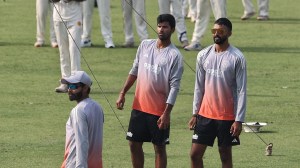ATS grew under Raghuvanshi
A 1980 batch IPS officer hailing from Muzaffarnagar in UP,Krish Pal Raghuvanshi has held a wide array of sensitive postings in Maharashtra....
A 1980 batch IPS officer hailing from Muzaffarnagar in UP,Krish Pal Raghuvanshi has held a wide array of sensitive postings in Maharashtra. A mild-mannered and affable officer,the detection of the July 11,2006 Mumbai serial train blasts case under his supervision has been one of the highlights of Raghuvanshis career so far.
In the early 1990s,he was involved in tackling the Naxal menace as Superintendent of Police in Gadchiroli. In 1992,he introduced the innovative concept of the C-60 force comprising 60 police personnel to contain the Naxal problem. The men of this wing were trained in guerrilla warfare at reputed training institutes such as the Greyhounds Academy in Hyderabad.
Some of his other postings include Superintendent of Police of Ahmednagar,Deputy Commissioner of Police (Armed Police) and DCP Zone 7 in Mumbai,Assistant Inspector General of Police at the Maharashtra Police headquarters in Mumbai,and six years in the CBI as SP and DIG. In September 2000,the Democratic Front government appointed Raghuvanshi as the head of a Special Task Force constituted to initiate action against those indicted by the Srikrishna Commission.
When the Anti-Terrorism Squad was formed on July 8,2004,Raghuvanshi was put in charge of the new agency. Senior state police officers recall how Raghuvanshi,initially operating out of a single room in the Mumbai Police headquarters with only a handful of men,began building the crucial agency. As Joint Commissioner of Police (ATS),Raghuvanshi solved the 7/11 serial train blasts,with the ATS arresting 13 alleged Lashkar-e-Toiba operatives.
When the ATS was going through tough times following the death of Hemant Karkare in the 26/11 Mumbai attack,the state once again posted Raghuvanshi as its chief. Raghuvanshi faced the challenge of taking forward the Malegaon blast case in which his predecessor,Karkare,had laid bare the involvement of an extensive network of Hindu extremists. His most recent challenge was to spearhead the probe into the blast at the German Bakery in Pune.



- 01
- 02
- 03
- 04
- 05




























